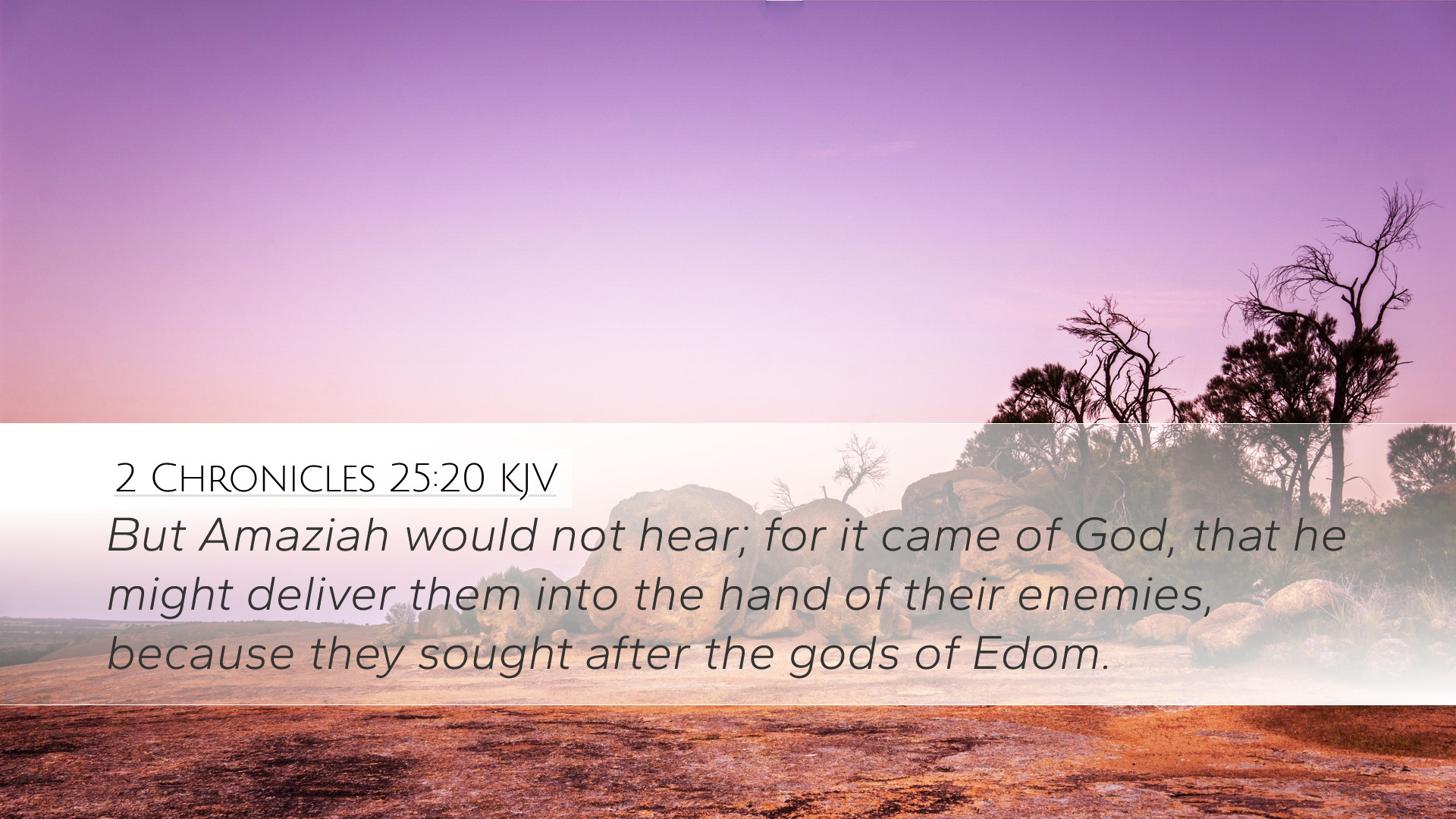Commentary on 2 Chronicles 25:20
Bible Verse: 2 Chronicles 25:20 - "But Amaziah would not hear; for it came of God, that he might deliver them into the hand of their enemies, because they sought after the gods of Edom."
Introduction
This verse encapsulates a profound moment in the reign of Amaziah, king of Judah, highlighting the intersection of human agency and divine sovereignty. The refusal of Amaziah to heed warnings and the consequent divine judgement reveal core themes of idolatry, divine retribution, and the theological dimensions of God’s governance over nations.
The Context of the Verse
Amaziah's rule is characterized by a mixture of obedience and rebellion against God. His initial military success was marred by his attraction to foreign deities, particularly the gods of Edom. This verse serves as a pivotal moment reflecting how Amaziah's foolish decisions led to divine intervention and defeat.
1. The Inflexibility of Amaziah
Matthew Henry notes that Amaziah’s refusal to listen to sound advice represents a tragic pride that often leads to downfall. He became increasingly obstinate in his reliance on foreign gods, which ultimately led to his demise.
2. Divine Sovereignty
Albert Barnes emphasizes that the events described in this verse are not merely the result of human decisions but are part of God's sovereign plan. The idea that “it came from God” suggests that sometimes, God's purposes are fulfilled through the disobedience of man. This portrayal of God’s sovereignty can generate a complex understanding of divine justice and mercy.
3. Idolatry and Its Consequences
Adam Clarke expands on the theme of idolatry and its ramifications. The pursuit of the gods of Edom not only estranged Amaziah from Yahweh but also set the stage for his eventual defeat. Clarke remarks that idol worship is inherently self-destructive, as it places trust in the powerless instead of the Almighty.
Theological Reflections
The themes in 2 Chronicles 25:20 serve as a microcosm of larger theological truths regarding human sin and divine retribution.
1. The Dangers of Pride and Self-Reliance
- Amaziah’s self-sufficiency clouds his judgment, leading him to ignore divine counsel.
- This prideful attitude resonates with the warning given throughout scripture regarding self-reliance (Proverbs 16:18).
2. The Role of Divine Providence
- The abandonment of Yahweh for the gods of Edom positions Amaziah against God's providential plan for Judah.
- God’s providence is often realized through the trials that ensue from human disobedience, serving as both punishment and corrective measure.
3. The Call to Faithfulness
- This narrative beckons believers to remain faithful amidst temptations to seek security in worldly powers or philosophies.
- Amaziah’s fate serves as a sobering reminder that turning from God leads to spiritual and physical peril.
Contemporary Applications
The insights gleaned from 2 Chronicles 25:20 remain relevant to contemporary audiences, especially in ecclesiastical settings.
1. Leaders and Counsel
Church leaders are reminded of the necessity of seeking wise counsel and the dangers of dismissing godly advice. Amaziah's downfall serves as a warning against the arrogance that may prevent leaders from listening to sound judgement.
2. The Nature of Idolatry Today
In the modern context, idolatry may not take the form of physical idols but can manifest through materialism, power, and cultural pressures. The community is called to internalize this warning and reassess where their allegiances lie.
3. God’s Grace Amidst Judgment
While 2 Chronicles 25:20 speaks of judgment, it also speaks to the call of grace; God desires repentance and faithfulness. There lies an ever-present hope that those who turn back to Him will find restoration.
Conclusion
2 Chronicles 25:20 offers a timeless message about the seriousness of turning away from God and the importance of fidelity to Him. It emphasizes not only the consequences of idolatry but also the sovereignty of God who orchestrates history towards His purposes. As students and scholars of the Word engage with this text, may they glean the lessons of humility, dependence on divine guidance, and the unwavering call to seek first the kingdom of God.


